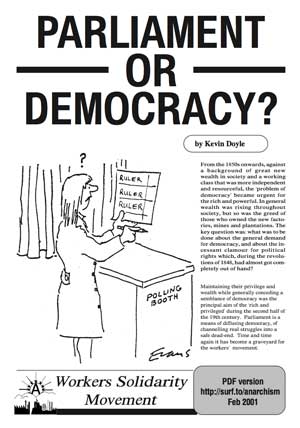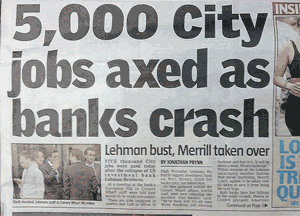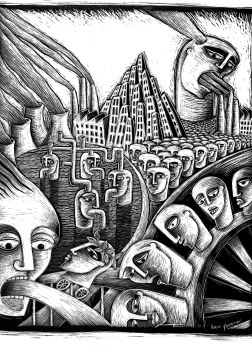Over 30 years of anarchist writing from Ireland listed under hundreds of topics
International
Parliament or democracy
 From the 1850s onwards, against a background of great new wealth in society and a working class that was more independent and resourceful, the 'problem of democracy' became urgent for the rich and powerful. In general wealth was rising throughout society, but so was the greed of those who owned the new factories, mines and plantations. The key question was: what was to be done about the general demand for democracy, and about the incessant clamour for political rights which, during the revolutions of 1848, had almost got completely out of hand?
From the 1850s onwards, against a background of great new wealth in society and a working class that was more independent and resourceful, the 'problem of democracy' became urgent for the rich and powerful. In general wealth was rising throughout society, but so was the greed of those who owned the new factories, mines and plantations. The key question was: what was to be done about the general demand for democracy, and about the incessant clamour for political rights which, during the revolutions of 1848, had almost got completely out of hand?
Thinking About Anarchism: The Politics of Climate Change
In recent years climate change has loomed large in the public imagination. Scientifically, there is little doubt that it is a real threat to the future of human civilisation. The greenhouse effect has been known about since the early 19th century - gases in the atmosphere such as carbon dioxide, methane and water vapour trap heat from the sun, causing the climate of the planet to heat up over time. Probably the most spectacular known example of this effect in action is on Venus.
International Women's Day: Why we celebrate on March 8th
 There are a few ways in which International Women's Day can be approached. It can be ignored. This is what mostly happens in the mainstream media. Unlike Valentines Day and Mothers Day, cards aren't given and presents aren't bought. With no profit to be made out of it, the day is not exactly one that jumps out and grabs the attention. International Women's Day is an expressly political day. In 1907 women sweatshop workers marched in New York and thus the first International Women's day was born. Often when women are celebrated it is because they are either cute (Valentine's Day) or caring (Mothers' Day).
There are a few ways in which International Women's Day can be approached. It can be ignored. This is what mostly happens in the mainstream media. Unlike Valentines Day and Mothers Day, cards aren't given and presents aren't bought. With no profit to be made out of it, the day is not exactly one that jumps out and grabs the attention. International Women's Day is an expressly political day. In 1907 women sweatshop workers marched in New York and thus the first International Women's day was born. Often when women are celebrated it is because they are either cute (Valentine's Day) or caring (Mothers' Day).
Building an anarchist international
Workers Solidarity Movement on building an anarchist international last modified by Feb 2013 National Conference
WSM articles on Palestine, religion and the middle east
 This is a collection of articles published in Workers Solidarity Movement publications about Palestine over the last decade, articles written by our members for publication elsewhere and material re-published elsewhere in publications our members edited. Together they provide the start of an anarchist analysis of the roots of the conflict and paths out of it.
This is a collection of articles published in Workers Solidarity Movement publications about Palestine over the last decade, articles written by our members for publication elsewhere and material re-published elsewhere in publications our members edited. Together they provide the start of an anarchist analysis of the roots of the conflict and paths out of it.
The historical development of the global financial order under US hegemony
In 'Financial Weapons of Mass Destruction', Paul Bowman examined the derivatives market and promised that the succeeding article would cover the 'story of the historical development of successive regimes of global financial orders' and would explain the role of the Eurodollars market 'in undermining the Keynesian Bretton Woods system'.
However, in the interests of space and relevance, I will only tell the story of the historical development of the regime of global financial order under US hegemony. I will begin by examining how the centre of capital accumulation shifted from Europe to the US in the first half of the twentieth century, and how following World War II the global financial order became centred around the US through the Bretton Woods system.
I will then look at how the Bretton Woods System was undermined, concentrating as much on the role of workers’ militancy as on the role of the Eurodollars market. After considering the response to the crisis of Bretton Woods, I'll look at the Clinton boom bringing us up to the current situation of the US’s current heavy dependence on foreign borrowing.
Financial Weapons of Mass Destruction
 Written months before the banking crash of the Autumn of 2008 this is the first part of a series of articles investigating the capitalist financial markets from a critical perspective. It explains in some detail what the various financial instruments are that were to be blamed for the crash and what implication they have for class struggle. (Image: Just around the corner)
Written months before the banking crash of the Autumn of 2008 this is the first part of a series of articles investigating the capitalist financial markets from a critical perspective. It explains in some detail what the various financial instruments are that were to be blamed for the crash and what implication they have for class struggle. (Image: Just around the corner)
The cause of the crisis in global capitalism
A very detailed talk on the cause of the current world financial crisis that starts off by explaining the background economics in an easy to understand manner, moves on to the role the war and other events apart from the sub-prime crash played and concludes with a look at what opportunities have been created for anarchist by this sequence of events.
People, Pollution, Profit and Production

The last century has been marked by the most explosive growth of pollution and production in the entire history of humanity. The changes brought about by industrialisation under the economic system of capitalism have lead to a large number of systemic problems. Anarchist communism is in a unique position to solve these systemic problems.
When we as workers engage in the production of goods and services, we do so for the benefit of the owners of the means of production. These capitalists, utilise our productive efforts to extract profits. This profit motive underlies many of the ecological and social problems that exist in modern society.
Left Communism & Its Ideology

Anarchism is today finally emerging out of its long held position as ‘the conscience of the workers’ movement’, as the eternal critic of Leninism and state centred politics.
It long took the side of the working class against the Party, a position Lenin mocked when he wrote: “The mere presentation of the question—"dictatorship of the party or dictatorship of the class(1); dictatorship (party) of the leaders, or dictatorship (party) of the masses?"—testifies to most incredibly and hopelessly muddled thinking....to contrast, in general, the dictatorship of the masses with a dictatorship of the leaders is ridiculously absurd, and stupid.”(2) Interestingly this was not written about anarchists, but rather about the position held by a Dutch-German Marxist tendency that was part of the Comintern. This tendency and others comprise what is known as ‘left-communism’. (Pic: Workers of Fiat in Italy take over the Factories )

